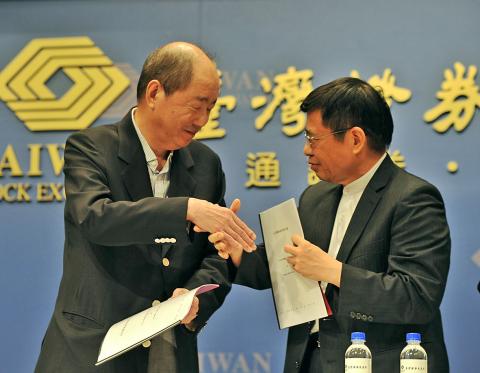Advanced Semiconductor Engineering Inc (ASE, 日月光半導體) yesterday clinched its acquisition of Siliconware Precision Industries Co (SPIL, 矽品精密) in an usual way, as SPIL agreed to a proposal to become a subsidiary of a new industrial holding company to be owned by ASE.
The announcement ends a nine-month ownership fight, as SPIL management has resisted a series of what it termed hostile takeover bids by ASE, the world’s biggest chip tester and packager.
SPIL officials yesterday signed a joint share-exchange memorandum of understanding (MOU) with their ASE counterparts to push for the creation of the holding company.

Photo: CNA
The signing came just one day after ASE issued a statement to say the two firms were in talks to create a joint venture holding company.
Based on the memorandum, SPIL is to sell all of its shares to the holding company at NT$55 per share, while ASE shareholders will be able to swap each of their ASE shares for 0.5 shares in the holding company.
ASE is to hold almost all shares of the new entity, which will only have 3.9 billion capital shares, half of ASE’s 7.8 billion shares.
The holding company is to own 100 percent equity interests in ASE and SPIL, while both existing firms will retain their legal entities.
However, the two companies are to be delisted from the Taiwan Stock Exchange, and the new holding company will debut its shares on the exchange and on Wall Street, the statement said.
“We believe the integration will generate more strength for us to expand our market share. I believe this is the main reason SPIL agreed to collaborate with ASE,” ASE chairman Jason Chang (張虔生) told a news conference in Taipei.
Chang said ASE and SPIL have a combined 15 percent global share and there is ample room for them to expand shares to 30 or even 40 percent in the wake of industrial integration.
SPIL chairman Bough Lin (林文伯), who had opposed ASE’s bids since August last year, said the proposal to allow SPIL to maintain its independent operation was the key factor behind his U-turn.
As ASE and SPIL are to operate independently under the new venture, Lin said he believes this would reduce customers’ concerns as much as possible and would have long-term positive spin-offs for both companies.
Although SPIL’s shareholders will not hold any stake in the holding company, ASE invited Lin and SPIL president president Tsai Chi-wen (蔡祺文) to be board directors of the new holding company.
Based on the MOU, ASE and SPIL are each to retain their respective management teams and employees, while their organizational structures, compensation, benefits and personnel regulations are to remain unchanged.
However, the memorandum needs approval from each firm’s shareholders, as well as from regulatory agencies around the world.

DAREDEVIL: Honnold said it had always been a dream of his to climb Taipei 101, while a Netflix producer said the skyscraper was ‘a real icon of this country’ US climber Alex Honnold yesterday took on Taiwan’s tallest building, becoming the first person to scale Taipei 101 without a rope, harness or safety net. Hundreds of spectators gathered at the base of the 101-story skyscraper to watch Honnold, 40, embark on his daredevil feat, which was also broadcast live on Netflix. Dressed in a red T-shirt and yellow custom-made climbing shoes, Honnold swiftly moved up the southeast face of the glass and steel building. At one point, he stepped onto a platform midway up to wave down at fans and onlookers who were taking photos. People watching from inside

A Vietnamese migrant worker yesterday won NT$12 million (US$379,627) on a Lunar New Year scratch card in Kaohsiung as part of Taiwan Lottery Co’s (台灣彩券) “NT$12 Million Grand Fortune” (1200萬大吉利) game. The man was the first top-prize winner of the new game launched on Jan. 6 to mark the Lunar New Year. Three Vietnamese migrant workers visited a Taiwan Lottery shop on Xinyue Street in Kaohsiung’s Gangshan District (崗山), a store representative said. The player bought multiple tickets and, after winning nothing, held the final lottery ticket in one hand and rubbed the store’s statue of the Maitreya Buddha’s belly with the other,

‘NATO-PLUS’: ‘Our strategic partners in the Indo-Pacific are facing increasing aggression by the Chinese Communist Party,’ US Representative Rob Wittman said The US House of Representatives on Monday released its version of the Consolidated Appropriations Act, which includes US$1.15 billion to support security cooperation with Taiwan. The omnibus act, covering US$1.2 trillion of spending, allocates US$1 billion for the Taiwan Security Cooperation Initiative, as well as US$150 million for the replacement of defense articles and reimbursement of defense services provided to Taiwan. The fund allocations were based on the US National Defense Authorization Act for fiscal 2026 that was passed by the US Congress last month and authorized up to US$1 billion to the US Defense Security Cooperation Agency in support of the

‘COMMITTED TO DETERRENCE’: Washington would stand by its allies, but it can only help as much as countries help themselves, Raymond Greene said The US is committed to deterrence in the first island chain, but it should not bear the burden alone, as “freedom is not free,” American Institute in Taiwan Director Raymond Greene said in a speech at the Institute for National Defense and Security Research’s “Strengthening Resilience: Defense as the Engine of Development” seminar in Taipei yesterday. In the speech, titled “Investing Together and a Secure and Prosperous Future,” Greene highlighted the contributions of US President Donald Trump’s administration to Taiwan’s defense efforts, including the establishment of supply chains for drones and autonomous systems, offers of security assistance and the expansion of